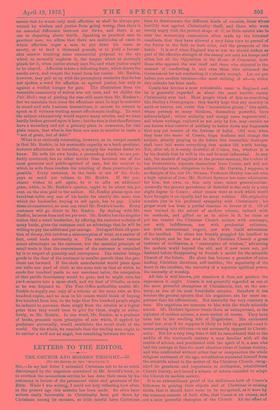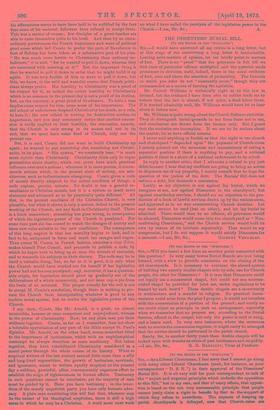LETTERS TO THE EDITOR.
THE CHURCH AND MODERN THOUGHT.—II.
[TO THE EDITOR OF THE " SPECTATOR.")
&H,—In my last letter I entreated Christians not to be so much discouraged by the negations contained in Mr. Arnold's book, as to overlook the momentous service he has done their cause by his testimony in favour of the permanent value and greatness of the Bible. While I was writing, I could not help reflecting how often in the present age this mistake has been made. So often have writers really favourable to Christianity been put down by Christians among its enemies, so little careful have Christians ' been to discriminate the different kinds of enemies, those whose hostility was against Christianity itself, and those who were merely angry with the present shape of it, so little careful also to note the momentary concessions often made by the bitterest assailants, that they have allowed a very false view to prevail of the forces in the field on both sides, and the prospects of the battle. It is as if when England was at war we should reckon as part of the effective strength of the enemy not only his troops and allies, but all the Opposition in the House of Commons, both those who opposed the war itself and those who objected to the manner of conducting it, and even those who criticised the Government for not conducting it zmtlously enough. Let me put before you another instance—the most striking of all—in which this mistake has been made.
Comte has become a most redoubtable name in England, and he is generally regarded as about the most terrible enemy Christianity ever had. Most people think of him as something like Shelley's Demogorgon ; they hardly hope that any sanctity in earth or heaven can resist this " tremendous gloom ;" this spirit, whose potency so many thinkers, themselves powerful, have acknowledged ; whose audacity and energy seem supernatural ; and whose writings, explored as yet only by few, may contain no one knows what reserve of artillery to batter down any fragments that may yet remain of the fortress of belief. Old men, when they hear the name of Comte, feign deafness and change the subject, silently praying to die before this irresistible destroyer shall have laid waste everything that makes life worth having. Yet, after all, it is surely doubtful of Comte, too, whether it is by his denials that he will in the end be most influential. At any rate, the masters of negation at the present moment, the leaders of the Destructives, separate themselves from Comte, and will not acknowledge much obligation to him. Mr. Darwin, I suppose, is no disciple of his, nor Dr. Strauss; Professor Huxley has not even a high opinion of him ; Mr. Herbert Spencer has some admiration for him, but owes to him only some minor generalisations. Assuredly the present prevalence of disbelief is due only in a very slight degree to Comte ; other causes were at work which would have brought it on equally had he never written. His originality consists just in his profound sympathy with Christianity ; his proper work has been a partial reaction in favour of it. Of all men trained in the school of modern science, imbued with its methods, and gifted so as to shine in it, he alone as yet has treated the Christian Church neither with contempt, nor with indifference, nor with prudential reticence, nor with conventional respect, nor with timid submission of the intellect. He alone has frankly grappled his intellect to the subject, and he has seen in the Christian Church a great institute of civilisation, a " masterpiece of wisdom," advancing the modern world beyond the old, and if now worn oat, yet destined before disappearing to furnish a model for the scientific Church of the future. He alone has become a preacher of some leading Christian doctrines, self-sacrifice, the superiority of the heart to the intellect, the necessity of a separate spiritual power, the necessity of worship.
All this is well known, yet somehow it does not produce the impression it ought. Comte is not generally regarded as one of the most powerful champions of Christianity, but, on the con- trary, as one of its most formidable enemies. Somehow it has become the general opinion that his negations are far more im- portant than his affirmations. But assuredly the very contrary is true. His negations are common to him with the whole scientific school. Mr. Herbert Spencer treats them as unimportant, as the alphabet of modern science, a mere matter of course. They have been lost in the swelling tide of Negativism. His celebrated social law, even if we suppose it likely to hold its ground—and it seems passing into oblivion—is not necessarily opposed to Christi- anity. But for a very long time it will be remembered that in the middle of the nineteenth century a man familiar with all the results of science, and penetrated with the spirit of it, a man who had the courage to face the most cheerless views of human destiny, and who confronted without either fear or compunction the whole religious sentiment of his age, nevertheless separated himself from the scientific school in the matter of the Christian Church, recog- nised its greatness and importance to civilisation, rehabilitated Church history, and issued a scheme of reform intended to adapt the Church to modern society.
It is an extraordinary proof of the skilfulness both of Comte's followers in gaining their objects and of Christians in missing theirs, that it should have come to be recognised, as it were by the common consent of both sides, that Comte is an enemy, and not a most powerful champion of the Church. All the effect of his affirmations seems to have been held to be nullified by the fact that some of his eminent followers have refused to accept them. This was a matter of course; few disciples of a great teacher are able to raise themselves quite to his level. And then by an extra- ordinary perverseness the French impatience and want of political good sense which led Comte to prefer the path of Revolution to that of Reform has been taken as a substantive part of his plan.
" He was ranch more hostile to Christianity than ordinary un- believers," it is said, "for he wanted to pull it down, whereas they are contented with sneering at it." But the important thing is that he wanted to pull it down in order that be might build it up again. It was very foolish of him to want to pull it down, but this, we know, is the wild and wasteful course that French politi- cians always prefer. His hostility to Christianity was a proof of his respect for it, as indeed the active hostility to Christianity which is so common in the present day is not a proof of its decline, but, on the contrary, a great proof of its advance. To bate a man implies some respect for him, some sense of his importance. The old school of unbelievers despised Christianity too much, as a rule, to hate it ; the new school in vowing its destruction confess its importance, and you may commonly notice that another conces- sion is really implied in their hostility, the concession, namely, that the Church is only wrong in its means and not in its end, that we must have some kind of Church, only not the present one.
But, it is said, Comte did not want to build Christianity up again ; he wanted to put something else, something not Christi- anity, in its place. "His system," we constantly hear, "is much more definite than Christianity. Christianity deals only in vague generalities about charity, which can never have much practical influence over men's actions ; wherever it is more precise, it recom- mends actions which, in the present state of society, are mis- chievous, such as indiscriminate almsgiving. Comte gives a code of morals directly adapted to the actual condition of things ; a code copious, precise, minute. No doubt it has a general re- semblance to Christian morals, but it is a system so much more elaborate and advanced as to be practically quite different." All this, in the present condition of the Christian Church, is very plausible, but what it shows is only a serious defect in the present working of the Church, not any fault in Christianity itself. There is a hitch somewhere ; something has gone wrong, in consequence of which the legislative power of the Church is paralysed. For some time past she has ceased to watch the changes of society and issue new rules suitable to the new conditions. The consequence of this long neglect is that her morality begins to look, and in fact to be, antiquated in form and much too meagre and vague. Then comes M. Comte, in French fashion, executes a coup d'Itat, makes himself First Consul, and proceeds to publish a code, by which he hopes both to bring up at once the arrears of centuries, and to reconcile his subjects to their slavery. The code may be in itself a valuable thing, but, so far as it is good, it is only what the Church would have worked out for herself if her legislative power had not become paralysed ; and, moreover, it has a question- able origin, for legislation should grow up gradually out of the deliberations of a whole community, and not issue cap-k-pie from the brain of an autocrat. The proper remedy for the evil is not to accept M. Comte's revolution, though there is nothing to pre- vent the Church from incorporating whatever is good in any modern moral system, but to revive the legislative power of the Church.
I say, then, Comte, like Mr. Arnold, is a great, an almost irresistible, because at once competent and unprejudiced, witness to the power of Christianity. Now, let any plain man put their evidence together. Comte, as far as I remember, does not show a tolerable appreciation of any part of the Bible except St. Paul's Epistles. Mr. Arnold, on the other hand, seems somewhat blind to the importance of institutions, which with an nnphilosophical contempt he always describes as mere machinery. But taken together, they have rehabilitated Christianity considered as a moral power through the whole course of its history. What to sceptical writers of the last century seemed little more than a silly and long-lived superstition, the growth of barbarism, servitude, and ignorance, seems to writers equally sceptical at the present day a sublime, powerful, often consummately sagacious effort to establish the reign of righteousness in human affairs. Testimony in such questions cannot be conclusive, yet the majority of men must be guided by it. Here you have testimony ; in the invec- tives of the merely negativist party you have only forensic advo- cacy. A plain man considering this will feel that, whatever may be the extent of his theological scepticism, there is still a high sense in which he may be a Christian. A word more next week
on what I have called the paralysis of the legislative power in the



































 Previous page
Previous page